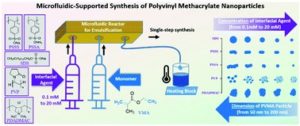Visaveliya et al. combine microfluidics with bulk batch synthesis to fabricate complex (non-spherical) anisotropic polyvinyl methacrylate (PVMA) nanoparticles (NPs) in a single step.
Τhe properties of polymer nanoparticles are dictated by both structure-property and structure-function relationships however, the importance of particle shape is generally overlooked due to the inherent difficulty to synthesize anisotropic nanoparticles in a single step. Anisotropic colloids are currently produced via multi-step synthesis platforms restrict scaling-up and evaluating as an alternative to the well-established spherical colloidal particles.
To address this issue, Eisele and collaborators developed a single-step, microfluidic-supported synthesis for anisotropic polyvinyl methacrylate (PVMA) nanoparticles that takes advantage of the homogeneous conditions given by microfluidics for the initial emulsification process and of the inhomogeneous conditions provided by bulk batch synthesis for the thermal polymerization. Α monomer with two active polymerization sites (vinyl methacrylate) was used and the impact of interfacial agents including a molecular surfactant (sodium dodecyl sulfate, SDS), anionic polyelectrolytes (poly(sodium 4-styrene sulfonate), PSSS and poly(4-styrene sulfonic acid) ammonium salt, PSSA), a cationic polyelectrolyte (poly(diallyldimethylammonium chloride), PDADMAC), and the non-ionic polymer (polyvinylpyrrolidone,PVP) on the shape and size of the produced nanoparticles was systematically evaluated. A direct effect of the identity and the concentration on the shape of the produced nanoparticles was observed and led to a plethora of structures varying from isotropic spherical structures (SDS) to anisotropic elongated (PSSS, PSSA) and flower-like structures (low PVP concentrations) or irregularly shaped assemblies (PDADMAC, high PVP concentrations).
In summary, this study provides a general framework to guide investigations on colloidal polymerization towards predicting nanoparticle shapes below the critical 200 nm regime.
Microfluidic-supported synthesis of anisotropic polyvinyl methacrylate nanoparticles via interfacial agents, Polym. Chem., 2022,13, 4625-4633
Link to the paper: https://pubs.rsc.org/en/content/articlelanding/2022/py/d1py01729b
 |
Dr. Kelly Velonia is an Advisory Board Member and a Web Writer for Polymer Chemistry. She joined the Department of Materials Science and Technology in 2007. Research in her group focuses on the synthesis and applications of bioconjugates and biopolymers
You can follow Kelly on twitter @KellyVelonia |











